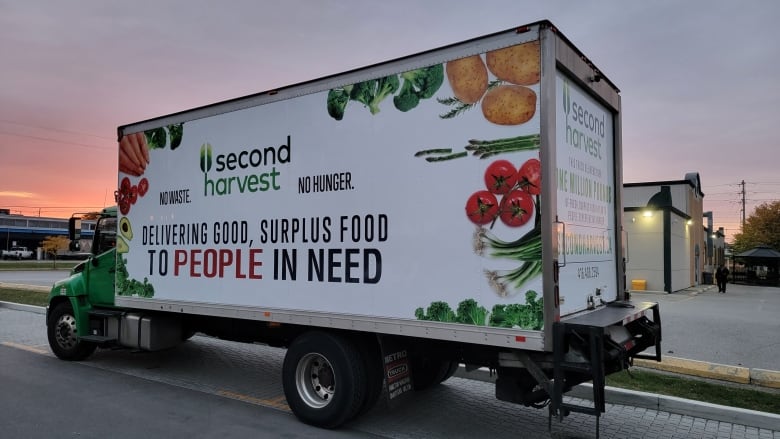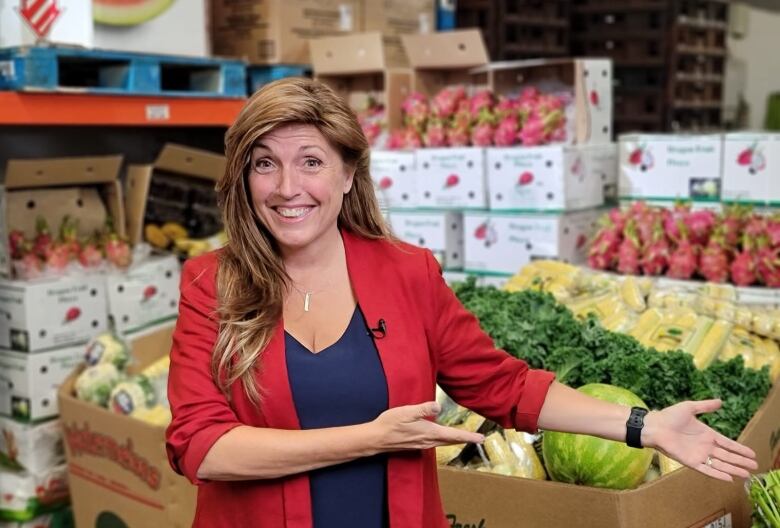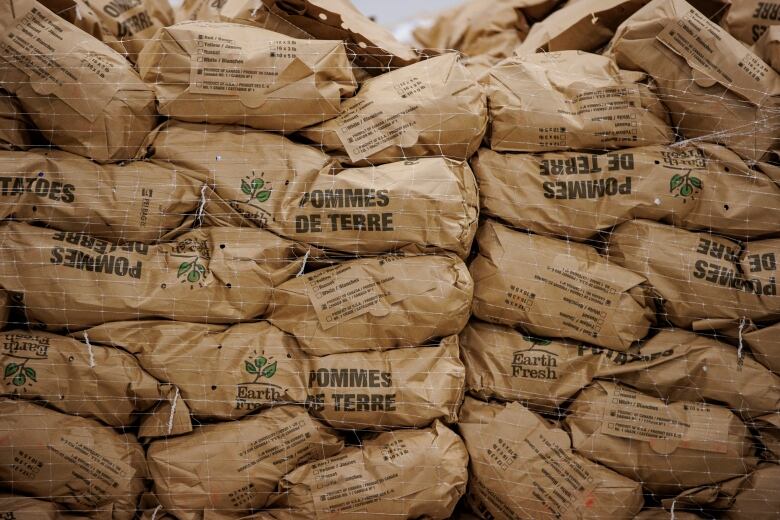100,000 people expected to turn to food charity in Toronto for 1st time this year, survey finds
Second Harvest says charitable food sector 'at a breaking point,' calls for government action

About 100,000 people are expected to turn to food charities in Toronto for the first time this year, according to new research by Canada's largest food rescue organization.
Second Harvest, which released the research on Tuesday, says that number represents a projected 30 per cent increase in demand for food charity in Toronto compared to the year before.
In December, Second Harvest surveyed 1,480 non-profit organizations in Canada that support people with food, including food banks, faith-based organizations, schools and shelters.The organization asked the food charitieshow they expectdemand to change in the coming year.
The survey, entitled Hungry for Change, paints a "very stark" picture ofthe sector, Lori Nikkel, CEO of Second Harvest, said at a news conference on Tuesday.
"This food network is at a breaking point and needs both food and money to meet the growing demand," Nikkeltold reporters,adding Canadians cannot keep up with rising food costs.
"Our systems are buckling under the pressure."
'New normal is not acceptable'
More than a third of food charities thatparticipated in the survey said they've been forced to turn people away, the survey found. That includes more than 50 per cent of the Toronto charities that participated.

Food insecurity is an "enormous" problem in Canada,Nikkel told CBC News, adding more and more people are being pushedtoward food charity.
"What's scary is that we're normalizing this. That this is the new normal is not acceptablewhen one in five people can't get the food that they need," she said.
"It's outrageous that millions of people are going to bed hungry every night literally. People are starving in Canada. We need policy change and fast."
Other findings include:
- Non-profit food programs across Canada expect an increase of 18 per cent in additional demand in 2024. That translates to more than 1 million people in Canada accessing food charity for the first time this year.
- A total of 43 per cent of non-profit food programs that participated in the survey say they willneed 50 per cent or more perishable food next year to meet demand.
- The average need for funding per non-profit food programs increased by 13 per cent from last year, which means an additional $76,000 is needed per charity to meet increased demand.
The findings have prompted Second Harvest to call on all levels of government to take action, sayingsolutions that address poverty and provide quick relief are needed most.
It also hopes to see public policy that requires businesses to measure and report food waste, it said.

That action could take the form offederal and provincial interventions, such asbringing back the Surplus Food Rescue Program, expanding eligibility for the GST grocery rebate, increasing minimum wagesand social assistance rates and lowering taxes for the lowest income households, it said.
At the local level, the city could implement a food waste program to redistribute left over food from food businesses, distributors, street festivals and events, it added.
'No person should go to bed hungry,' mayor says
Toronto Mayor Olivia Chow, who spoke at the news conference, said the problem stems in part from a lack of affordable housing.
"We have a housing crisis in our country and in our city because for 30 years we have not built any affordable housing. That's the core of it, because if people don't have to pay so much in rent, they will have some money left over for food," she added.

Chow said she is committed to building more affordable housing. In the city's recently approved budget, for example, she said the city plans to build 1,300 rent-geared-to-income units.
"No one should have to ask God for money to buy groceries. No kid should go to bed hungry. No person should go to bed hungry," Chow said.
Eddie Jjumba,a pastor atthe Milliken Wesleyan Methodist Church in Markham, told reporters at the news conference thatthe statistics are not just numbersand that charity fills a void.
"We are talking about people who are struggling to have food at the table," he said. "In the absence of policy, charity comes in."
Jjumba said there is not a shortage of food in Canada, but he urged Canadians not to eat more than they need and not to collect more food in their houses than they need.
Ministers pledgesupport for food programs
Provincial and federal ministers have pledged support and new funding for food programs in the past year.
In an Oct. 5, 2023 news release, Michael Parsa, Ontario's children, community and social services minister, said: "Proper nutrition is an important foundation for academic success, and students should have access to healthy and nutritious food to support their growing minds and bodies."
Parsa made the comment when he announced that the province was providing an additional $5 million for the Student Nutrition Program andFirst Nations Student Nutrition Program. Both programs provide more than 600,000 school children and youth with meals and snacks. The government said at the time the new moneybrought the 2023 program fundingto $38 million.
In a May 4, 2023 news release, Marie-Claude Bibeau, then federal agriculture and agri-food minister, said: "Now more than ever, we must support the work of organizations and food banks that help those who need it most."
Bibeau made the comment when she announced $10 million for a new phase of the Local Food Infrastructure Fund, a five-year, $70-million initiative that ends on March 31. It is part of the federal government's food policy, called "a roadmap for healthier and more sustainable food systems in Canada."
Second Harvest sent itssurvey to 4,403 non-profit organizationsacross Canada on Dec.5, 2023. The survey asked the organizations what they experienced in 2023 andwhat theyanticipate theiroperations and needs will be in 2024. The organization received 1,480 responses, with an overall response rate of 33.6 percent.












_(720p).jpg)


 OFFICIAL HD MUSIC VIDEO.jpg)
.jpg)



























































































